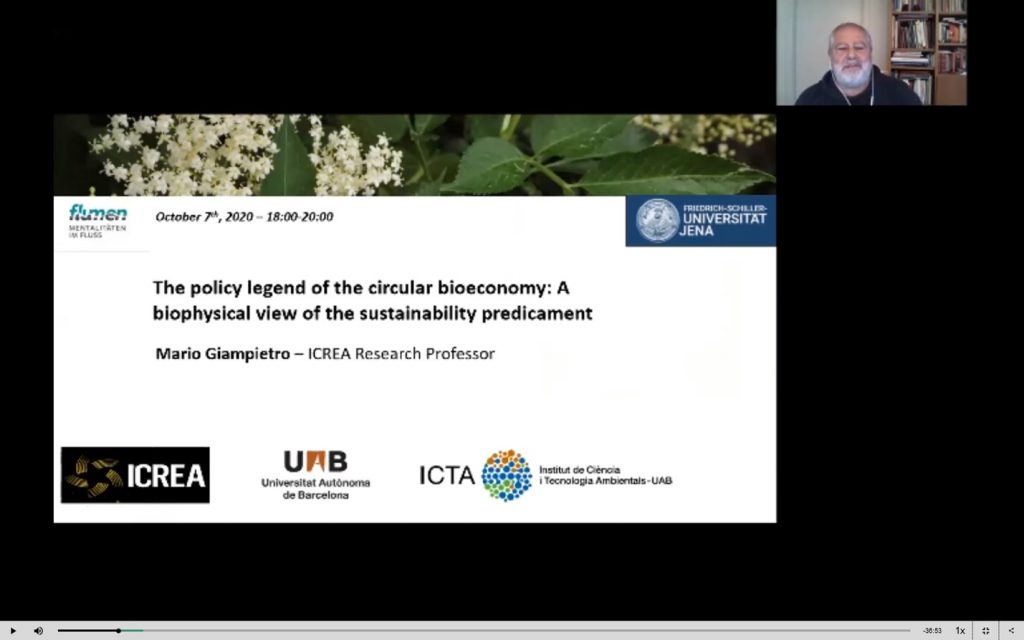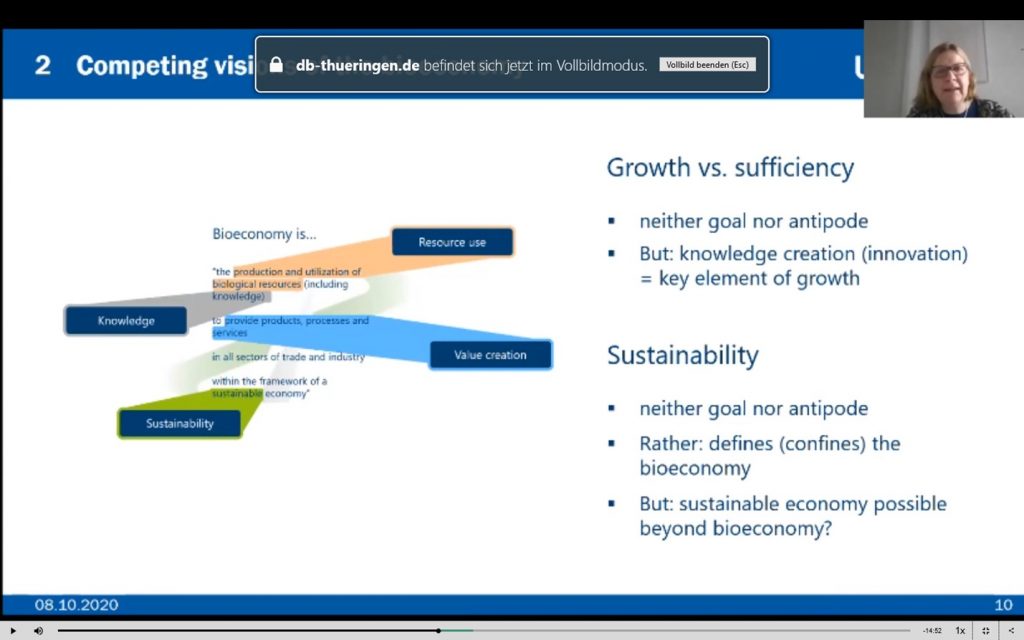Zwei der spannendsten Beiträge in unserem Workshop “It’s the Bioeconomy, stupid! The future of growth and the promise of the bioeconomy”, der vom 07. und 08. Oktober 2020 stattfand, waren die von Mario Giampietro (Universitat Autònoma de Barcelona) sowie Daniela Thrän (Helmholtz-Zentrum für Umweltforschung GmbH-UFZ, 2012 bis 2019 Ratsmitglied des Bioökonomierats). Mehr zum Workshop (Programm und Präsentationen)
Die Videos von den Beiträgen sind aufrufbar über den Link in den jeweiligen Titel:

Mario Giampietro, ICREA Research Professor, Institute of Environmental Science and Technology (ICTA) at the Universitat Autònoma de Barcelona: “The policy legend of the circular bioeconomy: A biophysical view of the sustainability predicament”, Online Vorlesung, 7. Oktober 2020. Moderation: Anne Tittor

Daniela Thrän, Helmholtz-Zentrum für Umweltforschung GmbH – UFZ, 2012-2019 Ratsmitglied des Bioökonomierats: “Bioeconomy’s Contribution to Economic Growth”, Online Keynote, 8. Oktober 2020. Moderation: Dennis Eversberg.
Die Vortragenden vertraten gegensätzliche Positionen
Mario Giampietro äußerte sich skeptisch gegenüber der Idee einer Kreislaufwirtschaft als wesentliches Element einer nachhaltigen Bioökonomie. Aus bio-physischer Perspektive analysierte er die Einträge und Ausgänge in eine Bioökonomie, die als ein energie- und stoffverarbeitendes System eingebettet ist in natürliche Vorgänge. Eine vollständige Kreislaufwirtschaft ist nicht möglich: Auch eine Bioökonomie benötigt viel Energie (die heute im übrigen überwiegend aus fossilen Ressourcen gewonnen wird), es fallen immer Abfallprodukte an, die nicht wiederaufbereitet werden können und um die globale Wirtschaft mit Biomasse zu betreiben, reicht die vorhandene Landfläche der Erde bei weitem nicht aus. Konflikte um Land sind also vorprogrammiert und werden beispielsweise in Südamerika schon länger auch mit Gewalt ausgetragen. Sein Vortrag verdeutlichte einmal mehr, dass Technologie, auch Biotechnologie, Umweltprobleme nicht lösen kann, wenn nicht gleichzeitig Fragen der sozialen Ungerechtigkeit und ungleichen Verteilung von Macht gestellt werden.
Daniela Thrän hingegen vertrat eine vorsichtig optimistische Perspektive. In ihrem Beitrag umriss sie die bereits erzielten Errungenschaften (z.B. genome editing) und Potenziale bei der Produktivitätssteigerung (mehr Nahrung vom selben Land), die eine verbesserte Biotechnologie ermöglicht. Darüber hinaus betonte sie, dass in der deutschen Öffentlichkeit und der Debatte um Bioökonomie das Thema Nachhaltigkeit heute eine viel größere Rolle spiele als noch vor einigen Jahren. So würden beispielsweise die Auswirkungen einer stetig steigenden Produktion auch im Bioökonomierat kritisch diskutiert. Ihr Beitrag stimulierte eine Diskussion über den Nutzen von technologisch erzielten Effizienzgewinnen, wenn diese durch Rebound-Effekte immer wieder „aufgefressen“ würden und letztlich doch wieder zu einem höheren Rohstoff- und Energieverbrauch führten. Wie Daniela Thrän erklärte, wird die Problematik der Rebound-Effekte in der biotechnologisch ausgerichteten Forschung als größte noch zu lösende Frage betrachtet. Sie sei aber bisher noch nicht Teil konkreter politischer Maßnahmen gewesen. Auch weil viele politische Maßnahmen zur Bioökonomie kontrovers diskutiert werden, befürwortet die Helmholtz-Forscherin eine Begleitung und Aufarbeitung dieser Aushandlungsprozesse durch die sozialwissenschaftliche Forschung.

